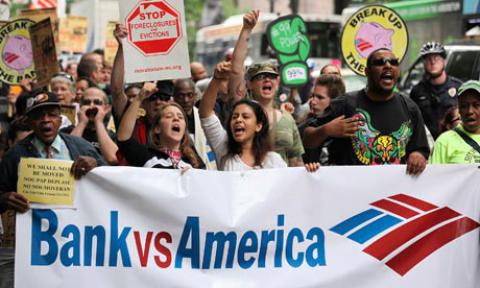Inflation hawks have been the talk of the town in elite economic circles in recent weeks. More liberal-leaning minds critique their (frankly) unsubstantiated concerns that the Federal Reserve is driving the U.S. economy toward high levels of inflation. Hawks are concerned that high levels of inflation due to expansionary monetary policy will lead to negative economic outcomes for major firms and, in turn, the rest of the American public.
Instead of worrying about inflation, which has remained at or below 1.5 percent for a year and a half, many prominent economists argue that we should focus on wage growth and jobs. We have seen profits for corporations rise to nearly pre-recession rates, while the poverty rate is not declining as fast as it should be. It’s clear there are some big policies that need changing: the minimum wage, the corporate tax structure, federal budget priorities, and regulations ranging across industries. So why is there so much focus on the Fed and the inflation hawks that circle it? Is there some policy lever we can pull here that would raise outcomes for the working class?
Let’s lay it out on the table: Current economic debates have focused on U.S. and global monetary policy because our fiscal policy problems appear to be inoperable. A Congressional stagnation, of sorts, has led to a fixation on a different institution, the Federal Reserve. But, overall, can this fixation actually translate into outcomes for the middle class?
With a gridlocked federal system, where can we push for substantial changes in wages and investment infrastructure that support the working class? Executive orders have their limits, of course. Advancements in cities like Seattle and New York City or states like Maryland have started to take effect. But at some point, a deeper, sustainable change must take place. This is a change in who leads in governance and who leads on policy change.
Elections are our general go-to on these matters. If political representation fails, we can just vote them out! Elections matter, but, there are some facts to consider. Currently, the average U.S. voter has an incomehigher than the median. This is due to lack of access, as well as the privilege of being able to make time to vote. Thus, we should open up opportunities, such as early voting, to more people. But even still, with faith in government falling, access reforms only go so far.
Beyond the act of voting itself, we have to question the responsiveness of the federal government, in particular, to voters. The growing influence of interest groups and coalitions of the wealthy make the ability to change political outcomes from the ballot box less and less secure.
We need to grow the bench. Deepening political participation in and beyond voting is key to achieving policies that raise outcomes for the working class. It is not enough to vote; government must be responsive. As Roosevelt Institute Fellow Sabeel Rahman notes, historic movements of substantial political reform have popular sovereignty and grassroots movements at their core.
Sabeel's words ring especially true in our current political climate. With congressional ineptitude and an unwillingness of the elites to take responsibility for the current state of our democracy, we must return to local movements and communities to build the foundations needed to create tangible economic change. That’s why members of the Campus Network are piloting the Rethinking Communities initiative. We recognize that democracy starts not in Washington but at home, in our own classrooms, our own cities, and our own communities.
There is no silver bullet or hero in this fight for economic justice. Not one public official, nor one economist, nor one President will solve our mess. A return to democratic principles and a deepening of participatory process is what it will take to uplift the working class.


Spread the word